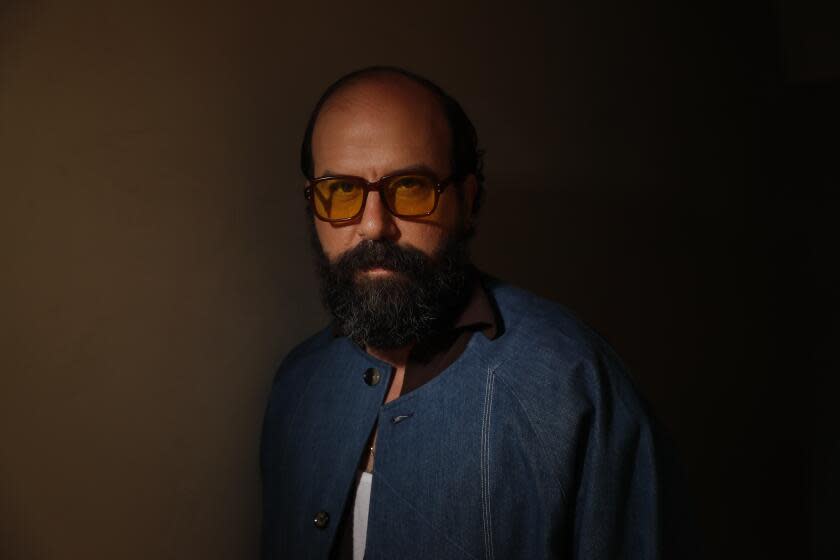'Stranger Things' star says his L.A. book event was canceled because of 'antisemitic intimidation'

- Oops!Something went wrong.Please try again later.
- Oops!Something went wrong.Please try again later.
Book Soup, West Hollywood's storied bookstore, has become the third stop on “Stranger Things” actor Brett Gelman’s debut book tour to cancel his appearance after receiving pushback and incensed messages in protest of the event.
Book Soup's cancellation, which it called “entirely a question of safety,” follows similar moves by San Francisco’s Book Passage and the Book Stall in Winnetka, Ill. The former said it objected to “intemperate and ill-advised remarks that [Gelman] made against some other ethnic and social groups,” and the latter cited security concerns — but Gelman said he senses an undercurrent of antisemitism.
Gelman has become one of Hollywood’s loudest supporters of Israel. Aside from advocating for Israelis on his social media accounts, Gelman also spoke at the November “March for Israel” rally in Washington, D.C., and has made several solidarity trips to Israel.
His debut short story collection, “The Terrifying Realm of the Possible: Nearly True Stories,” which he calls “a criticism of my own Jewish neurosis and self-hatred and identity,” will be released by HarperCollins imprint Dey Street on March 19.
Read more: An agent told this 'Stranger Things' star he wouldn't work until 50. 'She was wrong'
Having himself received intense threats in recent months, Gelman said he considered Book Soup’s safety concerns to be valid. But he’d also assumed that those concerns would be assuaged when he hired personal security for the event.
“I am really wondering if there was any direct threat made,” Gelman said, adding that Book Soup did not share the exact content of the messages it had received. “Is this bookstore pulling out because they don’t want to be seen as a business that would host me?”
In a statement about the cancellation, Book Soup said it “feels very strongly that a free society should protect individuals’ freedom of thought and expression. In the same spirit we respect individuals’ rights to not support people or books they don’t agree with, but we also believe in the foundations of democracy that allow individuals to decide those things for themselves.”
“We did everything we could think to do to continue the event (requiring tickets, security, evaluating venues),” the statement continued, “but in the end, the safety of the author, our staff, and attendees took precedence. The pushback and expressed concerns had persisted, and amidst the current charged environment the event became a risk we were not willing to take.”
Read more: More than 1,000 sign open letter decrying cancellation of German event for Palestinian author
Book Soup's move is part of a larger pattern of institutions scrapping appearances by Jewish and Palestinian authors, or those vocal about the Israel-Hamas war, for fear of stoking controversy.
In October, following Hamas’ surprise attack on Israel, a German literary association canceled an award ceremony that was set to honor Palestinian author Adania Shibli for her novel, “Minor Detail,” which recounts the rape and killing of a Palestinian girl in 1949 by Israeli soldiers. A few days later, a New York cultural center paused its literary reading series after receiving pushback for canceling an event with Pulitzer Prize-winning author Viet Thanh Nguyen, who has been openly critical of Israel.
Earlier this month, protesters from the Writers Against the War on Gaza coalition "committed to the liberation for the Palestinian people" disrupted a PEN America event with comedian Moshe Kasher and actor Mayim Bialik, an outspoken supporter of Israel. One of the protesters, Palestinian American writer Randa Jarrar, was physically removed from the auditorium.
“As a free speech organization, we defend and uphold the right to protest,” PEN America wrote in a statement about the disruption. “However, we are firm in the conviction that protesters — while they have a right to be heard — cannot be allowed to shout down, shut down, or obstruct the speech of others.”
Read more: How antisemitism came roaring back into American life
Aaron Terr, director of public advocacy at the civil liberties group Foundation for Individual Rights and Expression, warned about the potential chilling effect of recent postponements and cancellations in an October interview with the New York Times.
“It enables the heckler’s veto,” Terr said, “where people are able to shut down speakers just by threatening to create a disturbance.”
Gelman said he believes Book Soup perpetuated this narrative by “giving into antisemitic intimidation.”
“If they’re really terrified,” he said, “I feel for them. But if they are doing this because they fear for what their reputation as a store is going to be, or how they’re going to be seen by the side [of social justice] that I’ve always stood with that I feel betrayed by right now, shame on them. Shame on them for that. Shame on them for blocking the conversation.”
In the age of social media echo chambers, which are “erasing empathy in real time,” Gelman said, the onus is on institutions to resist the urge to avoid polemical subjects like the Israel-Hamas war, promoting civil dialogue that breeds understanding rather than further division.
Read more: Gaza cease-fire talks fail to achieve a breakthrough
“We should be amplifying voices — humanistic voices, not extreme voices — that want to have a conversation about this,” he said, whether they're Israeli or Palestinian.
By having those conversations, Gelman said he hopes “we can really help push forward representation for both groups of people a lot more, and not see both of our cultures as dangerous cultures to deal with.”
Gelman is working to reschedule the canceled book events at local Jewish community centers and temples.
This story originally appeared in Los Angeles Times.

